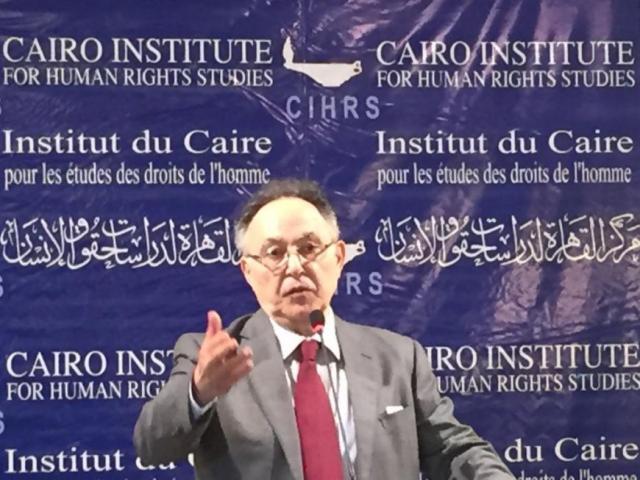
Sentencing Bahey el Din Hassan: A fresh episode of criminalization of free expression of opinion in Egypt
Press Release
The Egyptian Initiative for Personal Rights (EIPR) condemns the verdict passed in absentia by the Fifth Circuit of the Criminal Court (terrorism felonies) with 15 years’ imprisonment for Bahey El Din Hassan, founder of Cairo Institute for Human Rights Studies (CIHRS), and one of the pioneers of Egyptian human rights work throughout its history. The EIPR affirms that the judgment's reliance on the articles of the penal laws in addition to the anti-cybercrime law is an indication of the size and nature of the legal blockade imposed on freedom of opinion, expression and civil work in Egypt today, as Egyptian citizens face a legislative maze that allows for multiple and harsher punishment for acts that are not criminalized in the first place, whether by the Egyptian constitution or by international conventions ratified by successive Egyptian governments and which form part of the national law under the provisions of the constitution itself.
Investigations in this case began in July 2018 based on a group of Hassan’s posts published on social media about the human rights situation in Egypt, which were considered "spreading false news" and "incitement against the state." In parallel with these investigations, investigations continued in another case, in which "Hassan" faced charges of insulting the judiciary, based on the same online material, and in which he was sentenced in absentia to three years’ imprisonment in September 2019. In other words, Bahey El Din Hassan was sentenced in two different cases and with different legal articles based on the same published material, which even hypothetically opens the way for new cases against "Hassan" in the future based on the same material.
Egyptian and international human rights organizations, as wellpolitical and unionised forces, had alerted to the seriousness of repeated criminalization and the repetition of punishment for the same acts - acts which should be protected by our constitution in the first place. These reservations and warnings were presented during the parliamentary deliberations that preceded the approval of the Law on Combating Information Technology Crimes (No. 175 of 2018) known in the media as the Cyber Crime Law issued in August 2018; these reservations fell on deaf ears. Ignoring those reservations have resulted in hundreds of Egyptian detainees who are serving various punitive terms due to the publication of opinions on social media that the judiciary deemed "false news" or "materials disturbing social peace" or even "misuse of social networking sites." These extremely broad formulations of punitive texts constitute a practical criminalization of expression of opinion. The have already opened the way to transform the Internet, especially social networking sites, into a new arena for repression after the right to peaceful assembly was criminalized under the 2013 protest law, which is applied more arbitrarily than the texts of the law itself permit in a manner that criminalizes any form of assembly in advance.
This in addition to the practical siege on independent press platforms, whether by the illegal and unprecedented blockage – the most widespread in the history of Egypt - of hundreds of sites or the constant restriction of their work through the work of institutions such as the Supreme Media Council and the National Media Committee, has led to the effective closure of public space for expression.
In this context, independent human rights activists are facing double restrictions. The first is due to the ongoing investigations of Case 173, known in the media as the “Foreign Funding Case”, which also includes the name of Bahey El Din Hassan on its list of defendants, as well as 31 other defendants whose bank assets were subject to a freeze or were prevented from traveling according to the procedural decisions of the investigating judges. Secondly they face additional criminal prosecution based on posts on social media and citing articles from anti-terrorism laws and the cybercrime law.
Finally, the Egyptian Initiative affirms its full solidarity with Bahey El Din Hassan and calls for the charges against him to be dropped and the investigations to be closed. EIPR also stresses the need for the next parliament to reconsider a host of articles in the penal code,penal laws, the counter-terrorism law and combating cybercrime law that impose unconstitutional restrictions on freedom of opinion and expression, thereby opening the door for the release of thousands of prisoners under the provisions of these articles.



